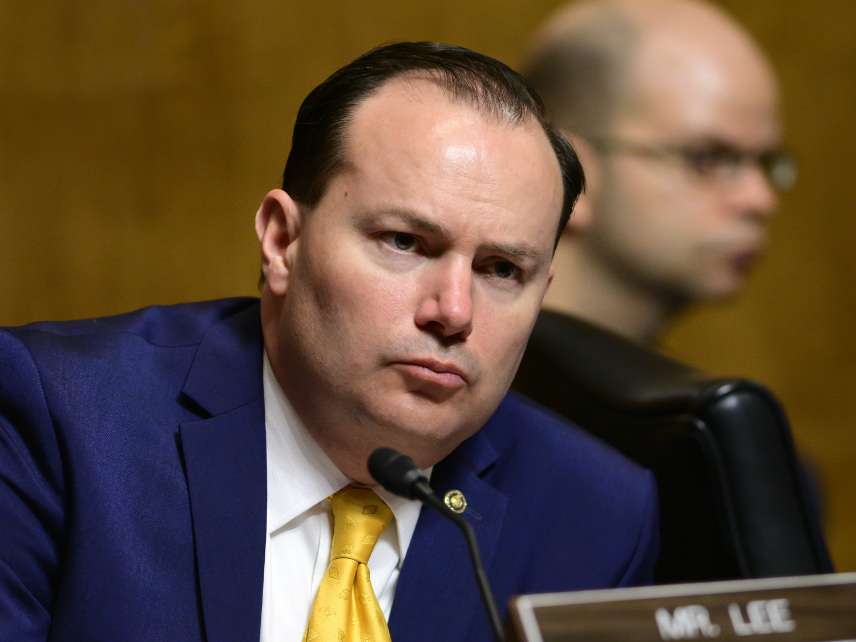Sen. Mike Lee's Bill To Limit Trump's Emergency Powers Doesn't Actually Address the Immediate Problem
Lee's new bill would automatically terminate emergency declarations within 30 days, but leave Trump's current national emergency intact.

Come Thursday, the Senate is expected to vote on a resolution terminating President Donald Trump's national emergency declaration, something that has put Senate Republicans in a tough position.
Voting yes on the resolution, which passed the House in late February, would reaffirm their rhetorical commitment to containing executive overreach and check a naked power grab by the president. It would also risk pissing off Trump and the GOP base, who're depending on the current emergency to fund the president's border wall.
Fortunately, Sen. Mike Lee (R–Utah) may have given these lawmakers an out. On Tuesday, the Utah senator introduced a new bill that would leave Trump's current emergency declaration intact, while placing restrictions on the future exercise of emergency powers.
Lee's bill—the awkwardly named Assuring that Robust, Thorough, and Informed Congressional Leadership is Exercised Over National Emergencies (ARTICLE ONE) Act—would automatically terminate an emergency declaration within 30 days.
Congress would have to pass a resolution explicitly endorsing an emergency declaration to prevent it from sunsetting. The bill would also give Congress the power to limit or amend the scope of any emergency declaration, and require the president to report how exactly his emergency powers are being put to use.
The idea, says Lee, is to claw back some of the powers Congress' has ceded to the executive branch over the years.
"If Congress is troubled by recent emergency declarations made pursuant to the National Emergencies Act, they only have themselves to blame," Lee said in a statement. "If we don't want our president acting like a king we need to start taking back the legislative powers that allow him to do so."
Whatever the intentions of the legislation, however, its introduction now could well enable the president's use of emergency powers in the short term. Lee's bill would allow senators to vote to keep Trump's wall-funding emergency in place, while also claiming that they are checking future abuses of executive emergency powers.
Sen. Thom Tillis (R–N.C.)—one of four Republicans who've said explicitly they would be voting in favor of terminating Trump's emergency declaration—is already wavering on that commitment following Lee's unveiling of his bill, according to The New York Times.
His defection alone could be enough to sink the House's resolution.
"If you would have asked me before…then I would have said, in the Senate, the president is going to lose," Sen. Joe Kennedy (R–La.) told the Times. Now, he's not so sure. "A lot of people are trying to think of a way to express their support for the president, but at the same time express their concern" about executive overreach, he said.
In addition to possibly preserving Trump's current wall-funding emergency declaration, it's also questionable how much Lee's legislation would limit the future ability of any president to declare national emergencies.
While the bill would automatically terminate these emergencies within 30 days, the president could still circumvent Congress by simply re-declaring a national emergency every month.
A spokesperson for Lee's office told Reason that while there's nothing in the senator's bill to prevent this kind of behavior, "such obvious shenanigans would be politically unsustainable."
That's certainly possible. But given that Congressional Republicans largely lack the political will to check Trump's current invocation of national emergency powers (powers many of them think the president shouldn't have in the first place), one wonders if they'll be more willing to check future excesses that still technically conform to the letter of the law.
"The history of these big framework statutes doesn't give you a lot of reason to hope that a new framework statute is going to solve the problem of lack of Congressional will to fight the executive branch on these things," says Gene Healy, Vice President of the libertarian Cato Institute and an expert on presidential powers.
Healy points to the War Powers Act—which puts limits on the ability of the president to deploy into foreign conflicts without Congressional authorization—as an example of a well-meaning statute that presidents have nevertheless managed to ignore or skirt without repercussion.
Nevertheless, Healy says that Lee's bill is a good first step toward reigning in presidential emergency declarations.
"I think it's a start. It would be better if these things are time-limited," he tells Reason. Healy also praised the bill's requirement that Congress approve an emergency for it to continue. The current National Emergencies Act allows emergencies to continue unless Congress explicitly votes to terminate them.
A more comprehensive approach, says Healy, would be to pare back the powers a president can unlock with an emergency declaration.
A Brennan Center paper from December 2018 found 123 statutory powers the executive can unlock by unilaterally declaring an emergency. There are currently 31 active national emergencies, some of which date back to the Carter Administration.
The New York Times reports that over a dozen Republican senators have said they'd support Lee's bill. House Speaker Nancy Pelosi (D–Calif.) today said that even if the ARTICLE ONE Act passed the senate, she would not bring it up for a vote in the House.
Rent Free is a weekly newsletter from Christian Britschgi on urbanism and the fight for less regulation, more housing, more property rights, and more freedom in America's cities.
Show Comments (40)